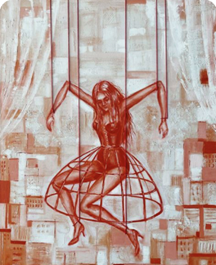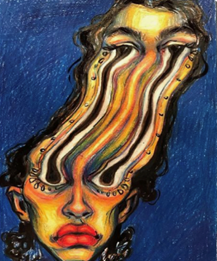by Zaria Jankelovitz-Gelvan
The simple matter of being female inherently forces us into a political role. Owning a female body pushes character into the political zeitgeist, then forces an opinion that is silenced. Let me first confess, mine is a subjective opinion. This is based on my own past experiences and filtered by the oppression and history (or may I say, herstory) of my ancestors and the incredibly powerful women in my life. That is not to disqualify my thesis, or the research I will be referencing, from the conversation. I merely encourage you to think critically about my words and the words I will attempt to borrow and lend from others. I invite you to introduce your own history, your own experiences, your own emotions. Politics is not a system to be revered and undisputed, I invite you to make it an emotive experience. Get angry. Get upset. Get thinking.
I feel it necessary to address female presentation in literature, as a mirror of the societies around us – we must acknowledge the consistent enforcing of politics of female characters in literary spaces.
Before such an argument, let’s define politics. It is the governance, ownership and relationship of power. It is our agency over our own beliefs and agreement with the way our population and space are controlled.
In a Yale-New Haven essay on female stereotypes in literature, Jill Savitt proposes that the role of women is a perpetuating oppressive one, consistent in the ever-changing representation of men. While men may see themselves as characters open to opportunity and change, female characters in literature are “seen as cages – small and unnaturally restricting,” wherein not only is their role in literature constrictive but they “internalize the male idea of the feminine and create themselves in shape of that idea”. They must fit into these cages created by the predominantly male authors writing them.
If women are trapped by androcentric literature and its frameworks for our characters, why aren’t more women writing literature outside of the literary stereotypes?
Here I would like to propose the well-known thesis of Virginia Woolf, in which “a women must have a room of her own in order to write fiction” and suggest that perhaps Woolf’s wishes have been accomplished. Increasingly we have seen women’s literature taught, studied and venerated in academic and recreational spaces alike. As Professor Lyndal Roper notes, “the rise of women’s and gender studies and accomplishments has coincided with the arrival of women in positions of economic and political power”, just as Woolf hypothesized the rise of women with economic autonomy directly resulting from their emergence in art and literature. However, we now rarely allow female characters to exist outside of a gendered and political context. Regardless of genre, time, or intentions of the author – we constantly filter our perception of women in literature through a political lens.
We must then consider the connotations of our own bodies. If literature reflects the people’s reality, then what does that imply for our own female bodies as an ever-conflicting political battleground?
Let us then take this into the more real scope of a psychological lens and the intergenerational trauma of women and femininity. Studies have increasingly shown the transmission of trauma symptoms through generations. In this way, descendants can experience symptoms of trauma without ever experiencing the trauma themselves. In fact, studies (such as that by Kathi Valeii) have even shown this trauma to be linked to our physical genes and being transmitted epigenetically. Such feelings are passed on more poignantly when the sufferer of said trauma feels guilt or shame to speak within their community. A rhetoric often occurring in female victims of sexual violence.
Rwanda’s 100-day-long genocide of the Tutsi population was perhaps violently distinguished by the estimated 300,000 women who were brutalized and subject to atrocious acts of sexual violence. The women then faced social stigma and alarming societal obstacles. Distressingly, the children born of genocidal rape have been reported to experience depression, physical problems (e.g. migraines), and attachment issues (Sarille Kahn). The mother's role is undoubtedly important, but it continuously places her and her children in a vulnerable yet heavily political role.
But let me make it clear. This is not an issue localized to one country or region. WHO states that 1 in 3 women worldwide will be subjects of sexual violence. 55% of all female homicides are by intimate partners. The American Psychological Association suggest women who experience trauma are twice as likely to experience PTSD as men and women are more exposed to interpersonal trauma. We should all be concerned.
So, to take an interdisciplinary analysis with both literature and psychology in her book, ‘Pure Flame’, Michelle Orange comments on the generational strife between mothers and daughters being partly rooted in the contradicting beliefs of womanhood that feminism proposes. Whether it be Orange writing about her own mother in London, or the incredible resilience despite the sexual violence imposed on women; the mother and daughter must not only be forced into a political role - but perhaps the political atmosphere they live in oppresses and abuses them so that they inherently pass it on to future generations.
Then, within the political space itself we see women repeatedly abused and even killed simply for their womanhood. The probability for a violent attack is three times more likely for a female mayor.
Imagine the scene of 41-year-old MP Joanne Cox walking to a meeting at the library in her constituency when she was struck, shot twice in the head and stabbed 15 times in the heart, lungs, abdomen and right arm, dying before emergency services could save her. Despite Joanne’s political stance or external context, would a man in her position face the same fate? Or politician, activist and feminist, Marielle Franco, who on her way back from an event she planned called “Young Black Women Shifting Social Structures” she was brutally shot three times in the head and once in the neck, her murderer never found. I do not merely wish to argue that women are forced into political roles, but when they courageously and honourably choose to dedicate their life to bettering the systems – they are all too often met with barbarous ends. In their deaths, their voices stripped from society all together and perhaps only hope to serve as martyrs for the future.
Even when conservative parties force women into their defence of anti-trans bills, suggesting a protection of femineity and female spaces, this is done without the choice or consent of majority of women. When figures in such limelight as Ben Shapiro suggest that we need to “protect women from men masquerading as women in sport”. Or, in Joanna William’s “Corrosive Impact of Transgender Ideology” wherein she argues it “paves the way for males to be able to enter female-protected spaces and access provision intended for females”. But regardless of the transphobic arguments, founded on the grounds that transgenderism is a mental disorder (which it clearly is not, given the well-researched and scientific analysis by WHO, the NHS and many other reputable sources). Why do we then continuously feel the need to use women as political and social weapons? Why do conservative leaders only bring women into their conversation when it is to use them as political barriers?
I am aware I paint a bleak picture here. How then do we make women a neutral space? Or rather, should we? Is it possible to depoliticize gender and see women as their own individual entities as we see men? Simone de Beauvoir may argue there is no “essence” of women, and we are conditioned to the feminine category. But at the same time, she claims she cannot escape today’s societies or her predicament of being a woman. Chimamanda Ngozi Adiche will claim “the whole premise of inclusiveness is difference”, to which we must acknowledge the trauma of women and recognize ourselves as inherently in a political role. Perhaps then it is not an issue of an intrinsic politicisation, but of giving women the space to speak up. The option of having that voice and the choice to withhold.
---











